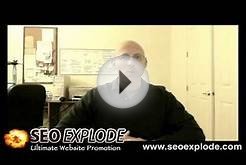 There are many ways to market your website without spending a fortune, as Chris Barling, chairman of ecommerce software provider SellerDeck offers some valuable advice on SEO as well as a few other online marketing tips
There are many ways to market your website without spending a fortune, as Chris Barling, chairman of ecommerce software provider SellerDeck offers some valuable advice on SEO as well as a few other online marketing tips
Online shopping is currently growing at a rate of 35% year-on-year, proving that the internet is a great place for businesses to beat the economic downturn. With the right idea and a little research, small firms with an ecommerce website can find and exploit a profitable niche at very little cost and compete successfully with bigger businesses. The following provides some tips for how to take advantage of this opportunity.
- Analyse search behaviour. Spend time researching what phrases searchers use online to find the things that you sell. Use Wordtracker to identify those that are widely used, but that also produce fewer than average search results. These phrases will give the best return. Also try typing things into Google to see what it autofills, these are the other key phrases. See for some ideas.
- Optimise for Google. Most consumers find a new website by using an online search engine. Google has 88% of the market so make sure your site ranks well on Google.
- Optimise high-ranking pages. In Google's search box, type the phrase you want to optimise for, followed by a space, then site: The first page listed from your site will be the easiest to optimise for that phrase.
- Design meta descriptions intelligently. The meta description for each page should be considered as advertising copy that is shown to the searcher in results and should be designed to get the user to click. Meta keywords are irrelevant and keywords in meta descriptions aren't used by Google.
- Optimise the important elements. Each key phrase should be incorporated naturally into the text of the page you are optimising at least three or four times. Always include the key phrase in the tag. This tag should be no more than 8-9 words long - so it's hard to optimise one page for more than three or four phrases. Use each phrase at least once in a heading or subheading, in
- Work on your links. The more links you have from good quality, high-ranking and relevant websites, the higher you will rank. If possible, get text links containing relevant keywords. Tread very carefully with reciprocal linking. Links should NEVER be bought. Technically, you're purchasing a link if you offer one back in return. Ideally, all links should be natural, so the important thing is great content that people want to share (e.g. blog posts answering questions). Contribute to forums and discussion groups, including a text link in your signature. But with forums, don't annoy people or try to force a link. Also most forums will use NOFOLLOW tags anyway, but they are still great to be involved in. Link building is a minefield... but an important one to cross.
- Watch your competitors. See what your competitors are doing. If they run a banner ad for a few weeks and then drop it, it probably didn't work - so don't waste your money copying. Anything they persist with is probably working and worth trying out. Also, search for them in Facebook, Twitter and other social media to see if they have any good ideas that you can copy.
- Use marketplaces wisely. Marketplaces like eBay and Amazon are popular, but margins are low. Don't make them the cornerstone of your business. Use them for offloading overstocked and end-of-line items, and to attract new customers and drive them to your main website.
- Use offers to boost profits. Run '3 for 2' offers, set up related product links and use 'also bought' functionality to increase the value of each sale. Email regular customers with exclusive offers to keep them coming back...









